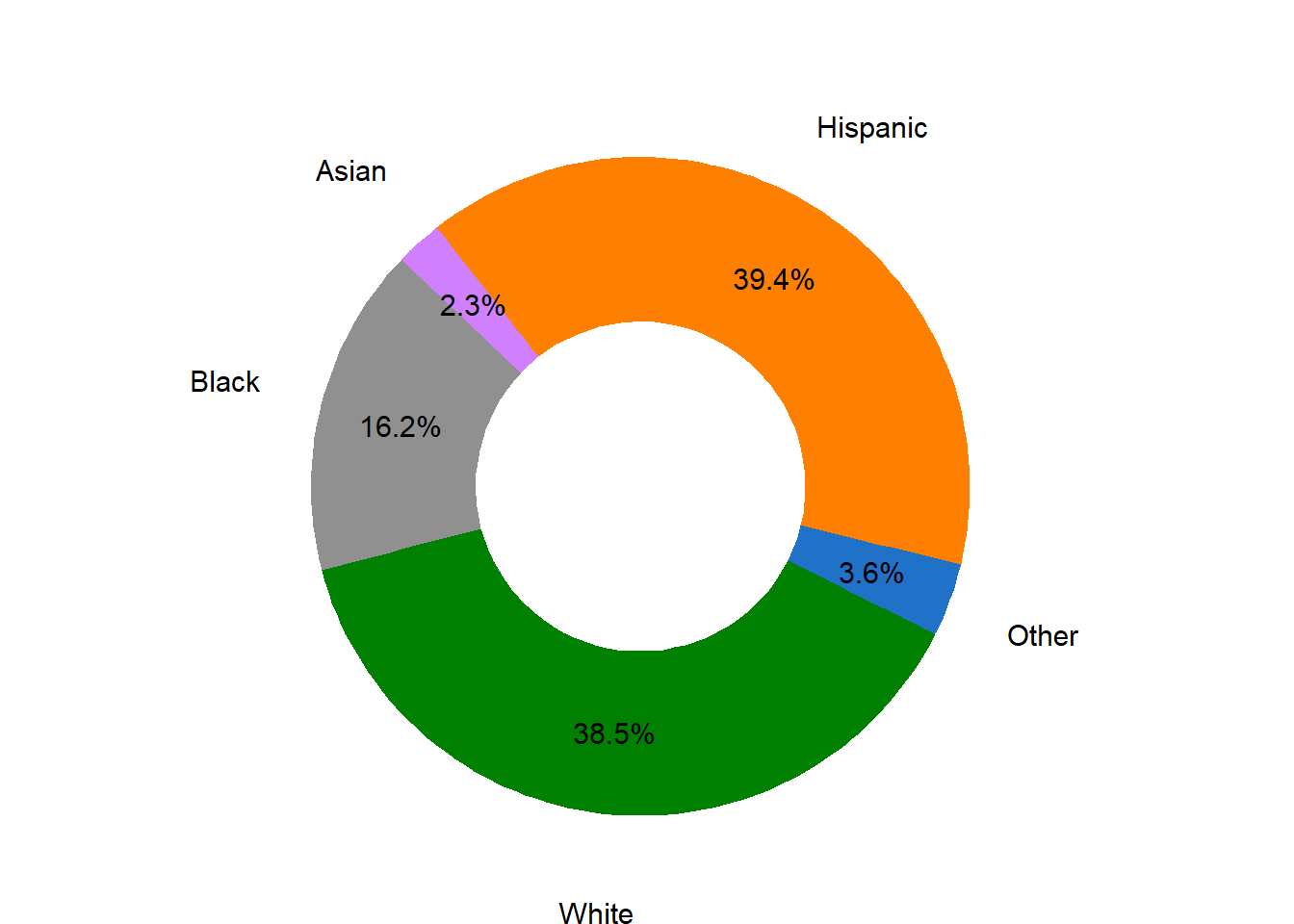Culture
Cultural identity of an area is often the product of the population’s Ethnicity, Ancestry, Language, and Religious Beliefs. This report will cover these areas for the Miami-Fort Lauderdale, FL Market.
Ethnicity
Racial groups in the US often include White, Black, Asian, and Other. In a similar context whether or not a person is of Hispanic origin is also typically a defining characteristic of ethnic identity. The following reports look at 5 ethnic categories, Hispanic, and non-Hispanic: White, Black, Asian, and Other.
Largest Ethnicity - White
The White Ethnicity makes up the largest share of the Population in the Miami-Fort Lauderdale, FL Market at 39.1%. This is yields a location quotient of 0.67 time the national average. Subsequently the Miami-Fort Lauderdale, FL Market ranks 152nd in the proportion of White Population across STI Markets.

Figure 11: Ethnicity Proportion in Market
Notable Ethnicity - Hispanic
The proportion of Hispanic Population in the Miami-Fort Lauderdale, FL Market is notable. This ethnicity comprises 39% of the market’s population, yielding a location quotient of 2.1 time the national average. Subsequently the Miami-Fort Lauderdale, FL Market ranks 15th in the proportion of Hispanic Population across STI Markets.
Ancestry
Ancestral origin across the US is quite varied with small communities existing from most parts of the world. Many of the smaller Ancestry groups are combined to “other” categories from the predominate larger ancestral region. Unclassified amount is also high among those that don’t know or give their ancestry or give a response that is uncommon. These categories will be excluded from the following reports and include the Other Hispanic, Other Asian, Other European, Other, and Unclassified Ancestries.
Largest Ancestries - Cuban, South American, and Central American
Large ancestries in the Miami-Fort Lauderdale, FL Market include Cuban, South American, and Central American . These ancestries make up 14.5%, 8.2%, and 4.8% of the total population, respectively. When comparing to national proportions, the Cuban ancestry is the most notable with a location quotient of 20.71 the proportion of this ancestry ranks 1st across STI Markets.
Sub-Market Ancestry Dispersion
Looking at those 3 Ancestries, which are most prevalent across the market.

Figure 13: Ancestry Thematic
Other Notable Ancestries - Dominican, Puerto Rican, and Italian
The Miami-Fort Lauderdale, FL Market is also home to a larger than average share of people with Dominican, Puerto Rican, and Italian Ancestries. These ancestries account for 1.6%, 4%, and 3.4% of the population, respectively. With location quotient of 2.67, 2.11, and 1.17 the Dominican, Puerto Rican, and Italian Ancestries rank 6th, 10th, and 28th across STI Markets, respectively.
Language
English is the predominate language across the US. There are however a number of other languages spoken depending on the market. Languages considered in this report include the Spanish, French, German, Slavic, Other Indo Euro, Chinese, Korean, Vietnamese, Other Asian, Tagalog, Arabic, and Other languages. The following is a look at the degree and dispersion of Non-English languages and language groups spoken in the Miami-Fort Lauderdale, FL market.
Non-English Languages - Spanish, German, and Other
The most widely spoken Non-English Languages in the Miami-Fort Lauderdale, FL Market include Spanish, German, and Other . These languages make up 35.3%, 3.8%, and 3.4% of the over 5 population, respectively. When comparing to national proportions, the Other language is the most notable with a location quotient of 0.67 the proportion of this language ranks 138th across STI Markets.
Religion
60% of the population in the Miami-Fort Lauderdale, FL Market is of unknown religious affiliation. This category is generally made up of those that are not religiously affiliated, though a small fraction may represent dharmic religions. This level of unknown religious affiliation ranks 19th across STI Markets. The following looks at the remaining 40% of the population that are affiliated.
It should also be noted that nationally approximately half of the religiously affiliated population would be considered Christian Protestant. This classification however encompasses many denominations with various beliefs and practices. We have subsequently grouped these church congregations by denomination and by a classification of Mainline and Evangelical disposition. You will see these groups described with ML and E respectively where a breakout by denomination is given and in other cases they are listed in total as simply Mainline or Evangelical.
Laregest Religions - Catholic, Evangelical, and Mainline
The 3 largest main religions in the Miami-Fort Lauderdale, FL Market are Catholic, Evangelical, and Mainline . These religions make up 49.2%, 20.8%, and 12.9% of the affiliated population, respectively. When comparing to national proportions, the Catholic religion is the most notable with a location quotient of 1.27 the proportion of this religion ranks 33rd across STI Markets.

Figure 15: Religous Proportion in the Market
Sub-Market Religious Dispersion
In the following map we look at those 3 largest religions and then group the remaining into a “Other” category.

Figure 16: Religous Thematic
Other Notable Religions - Jewish and Black Protestant
The Miami-Fort Lauderdale, FL Market is also home to a larger than average share of Jewish and Black Protestant religiously affiliated Population. These religious groups account for 10.1% and 2.4% of the religiously affiliated Population, respectively. With location quotient of 3.48 and 1.5 the Jewish and Black Protestant religions rank 2nd and 29th across STI Markets, respectively.

